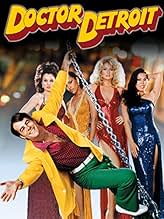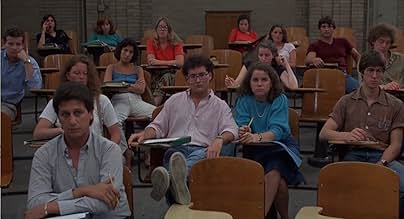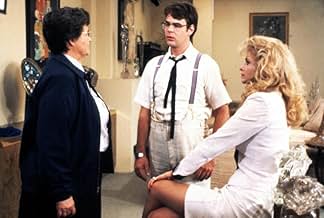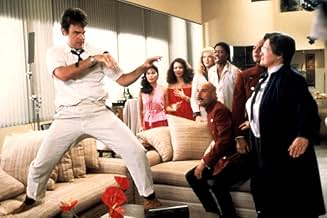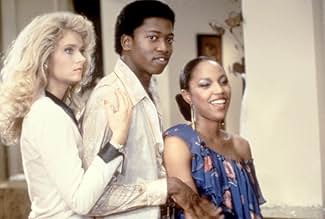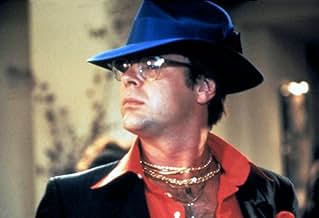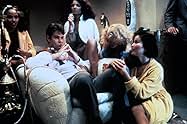IMDb RATING
5.2/10
6.2K
YOUR RATING
A pimp on the run trusts his prostitutes to a meek professor of literature, who accepts the challenge.A pimp on the run trusts his prostitutes to a meek professor of literature, who accepts the challenge.A pimp on the run trusts his prostitutes to a meek professor of literature, who accepts the challenge.
Ed Meekin
- Professor Durant
- (as Edward Meekin)
Rudolph Kovar
- Carson
- (as Rudolf Kovar)
Storyline
Did you know
- TriviaThis was the first movie that actor Dan Aykroyd made after his comedic buddy John Belushi (Jake Blues of "The Blues Brothers") had passed away, just three months before principal photography began.
- GoofsSmooth books a one-way flight to the Cook Islands, then local service to Roratonga. In fact the Cook Islands international airport is *on* Roratonga.
- Quotes
Clifford Skridlow: [towards the end of a rant as Doctor Detroit] ... Mom, if you want trouble--I am talking about scorched earth, no survival, whole-sale destruction... body-bags and fire TROUBLE
[smashes car windshield]
Clifford Skridlow: --then you just keep comin' on!
Mom: You don't know what trouble is, jerkoff!
Clifford Skridlow: Mom, I am going to rip off your head and shit down your neck.
- Crazy creditsThe credits end with "Coming soon: Doctor Detroit II, The Wrath of Mom."
- ConnectionsFeatured in Devo: Theme from Doctor Detroit (1983)
- SoundtracksTheme From Doctor Detroit
Written by Mark Mothersbaugh and Gerald Casale (as G. V. Casale)
Performed by Devo
Devo produced by Devo
Devo appears courtesy of Warner Bros. Records, Inc.
Featured review
In this move, Aykroyd presents a fresh look at what makes a man tick, his desires, feeling, emotions and passions. Aykroyd plays Clifford Skridlow, a somewhat nerdish college professor who is timid and mildly neruotic. This character speaks to a lot of us as we walk our way through life, often unnoticed and unsatisfied with our interactions with others. Longing for nothing but happiness, we weave our way through the obstacles of life much as Clifford rushes through the quad on the way to class, taunted and laughed at by the students surrounding him. But this isn't just another movie designed to identify with unsatisfied loners.
While enjoying dinner at an Indian Restauraunt (symbolizing the social and cultural diversity of humanity), Clifford is picked out by a local pimp to act as a scapegoat to avoid debt to Mom, of the infamous Mom's Limo Company. How many times have you been picked by those more successful than you to take the blame? It's getting a little to real at this point, as the action picks up it's pace. Clifford must invent an inner personality to cope with the feelings of rejection and hatred, and the character Doctor Detroit is born. He embodies all that Clifford wishes he could be, suave, feared, respected, wealthy, and adored by women. The metal hand on his left arm is a not so subtle attempt to portray the desire of the weak to be strong.
The strong reference to Nietzsche's idea of men rising up from the ashes and becoming a strong race of supermen cannot be ignored at this point, and it's clear that this is more than just a silly comedy. With his newfound alter-ego and inner strength, the doctor conquers evil and saves the day. In a triumphant final speed, the Doctor retires his inner personality encouraging the gathered crowd to be strong and find their own inner selves, while returning to a life of a normal, unknown man.
But what will happen to him? Why did he choose to let his inner self die? Was this a sacrifice, or a lack of courage? What would Nietzsche think about this complex analysis? This movie will leave you asking these any many questions. Highly recommended, especially as an introduction to other great works such as Nietzsche's Beyond Good and Evil.
While enjoying dinner at an Indian Restauraunt (symbolizing the social and cultural diversity of humanity), Clifford is picked out by a local pimp to act as a scapegoat to avoid debt to Mom, of the infamous Mom's Limo Company. How many times have you been picked by those more successful than you to take the blame? It's getting a little to real at this point, as the action picks up it's pace. Clifford must invent an inner personality to cope with the feelings of rejection and hatred, and the character Doctor Detroit is born. He embodies all that Clifford wishes he could be, suave, feared, respected, wealthy, and adored by women. The metal hand on his left arm is a not so subtle attempt to portray the desire of the weak to be strong.
The strong reference to Nietzsche's idea of men rising up from the ashes and becoming a strong race of supermen cannot be ignored at this point, and it's clear that this is more than just a silly comedy. With his newfound alter-ego and inner strength, the doctor conquers evil and saves the day. In a triumphant final speed, the Doctor retires his inner personality encouraging the gathered crowd to be strong and find their own inner selves, while returning to a life of a normal, unknown man.
But what will happen to him? Why did he choose to let his inner self die? Was this a sacrifice, or a lack of courage? What would Nietzsche think about this complex analysis? This movie will leave you asking these any many questions. Highly recommended, especially as an introduction to other great works such as Nietzsche's Beyond Good and Evil.
- How long is Doctor Detroit?Powered by Alexa
Details
- Release date
- Country of origin
- Official sites
- Language
- Also known as
- Dr. Detroit
- Filming locations
- Production companies
- See more company credits at IMDbPro
Box office
- Gross US & Canada
- $10,375,893
- Opening weekend US & Canada
- $3,295,722
- May 8, 1983
- Gross worldwide
- $10,375,893
- Runtime1 hour 29 minutes
- Sound mix
- Aspect ratio
- 1.85 : 1
Contribute to this page
Suggest an edit or add missing content



